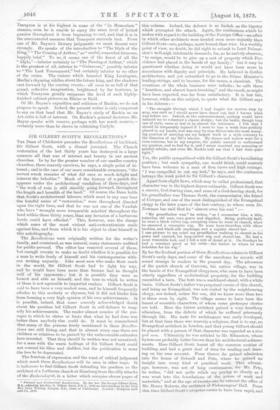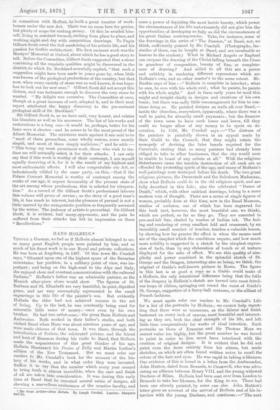SIR GILBERT SCOTT'S RECOLLECTIONS.* Tzz Dean of Chichester precedes the
Recollections of his friend, 'Sir Gilbert Scott, with a dismal jeremiad. The Church restoration of the last thirty years has destroyed in a large measure all that was of interest and beauty in our ancient churches. In by far the greater number of our smaller country churches, there scarcely survives, he says, a single point of in- terest; and in the case of our more considerable structures, "the merest wreck remains of what did once so much delight and interest the beholder." Much of the history of a parish dis- appears under the architectural vandalism of these days, and ." the work of ruin is still steadily going forward, throughout the length and breadth of the bind." Of course the Dean holds that Scott's architectural labours, which must in any case bear the hateful name of "restoration," were throughout directed upon the right lines, and that he was not one of the Vandals who have "wrought more irreparable mischief throughout the land within these thirty years, than any invasion of a barbarous horde could have effected." This, however, was the charge -which some of the most violent anti-restoratiouists made against him, and from which it is his object to clear himself in this autobiography.
The Recollections were originally written for the writer's family, and contained, as was natural, many statements unfitted for public perusal. The editor has removed several of these, but enough remain to make us doubt whether it is possible for a man to write freely of himself and his contemporaries with- out writing unjustly. Like most men who make their mark in the world, Sir Gilbert Scott had to fight his way, and he would have been more than human had he thought well of his opponents ; but it is possible they were as honest and able as himself, and the tone in which he writes of them is not agreeable to impartial readers. Gilbert Scott is said to have been a very modest man, and he himself frequently alludes to this modesty or shyness, but it did not hinder him from forming a very high opinion of his own achievements. It ' is possible, indeed, that some scarcely acknowledged doubt about his position led Gilbert Scott in self-defence to mag- nify his achievements. The reader almost wearies of the pas- sages in which he states or hints that what he had done was better than anybody else could do. It must be remembered that many of the persons freely mentioned in these Recollec- tions arc still living, and that in almost every case there are children or relatives to be pained by the unfavourable estimates here recorded. That they should be written was not unnatural, for a man with the warm feelings of Sir Gilbert Scott could not conceal his likes and dislikes, but the publication is none the less to be deprecated.
The freedom of expression and the want of critical judgment which mark these Recollections will be seen in other ways. It is ludicrous to find Gilbert Scott defending hie position as the architect of a Lutheran church at Hamburg from the silly attacks of the ..1licelesiologi at, in a letter which occupies eleven pages of
• Personal and Professional Recollections. By the late Sir George Gilbert Scott, A.A., edited by his Son, (I, Gilbert Scott, Ir.S.A., with an Introduction by the Very Rev. John William Sargon, S.D., Dean of Chichester. London : Sampson Low and Co., 1875.
this volume. Indeed, the defence is as foolish as the bigotry which prompted the attack. Again, the confessions which he makes with regard to the building of the Foreign Office—an affair in which other architects were treated even more unjustly than Gilbert Scott—are, perhaps, more honest than wise. In a worldly point of view, no doubt, he did right to submit to Lord Palmer- ston's well-nigh intolerable demands, for, as he naively observes, "to resign, would be to give up a sort of property which Pro- vidence had placed in the hands of my family ;" but it may be questioned whether doing so would not have been more in accordance with dignity and principle. He believed in Gothic architecture, and yet submitted to go in the Prime Minister's loading-strings, and to become, for the nonce, a classicist. The vexations of the whole business were infinite ; he calls them "heartless, and almost heart-breaking," and the result, as might have been expected, was far from satisfactory. It is but fair, however, while on this subject, to quote what Sir Gilbert says in his defence :—
" Tho struggle through which I had fought the matter, stop by step, was such as I should never have faced out, had I known what was before me. Indeed, at the commencement, nothing would have induced me to volunteer a classic design ; but the battle, though long one of style, came at last to be almost for existence. I felt that I should be irreparably injured if I were to lose a work thus publicly placed in my hands, and was atop by step driven into the most annoy- ing position of currying out my largest work in a style contrary to the direction of my life's labours. My shame and sorrow were for a time extreme, but to my surprise, the public seemed to understand my position, and to feel for it, and I never received any annoying or painful rebuke, and even Mr. Ruskin told me that I had done quite right."
Yes, the public sympathised with Sir Gilbert Scott's humiliating position ; but such sympathy, one would think, could scarcely have been welcome to a man of firm views and high courage.
"I was compelled to eat my leek," he says, and the confession betrays the weak point in Sir Gilbert's character.
Apart from slight flaws, which may be called professional, that character was in the highest degree estimable. Gilbert Scott was a sincere, God-fearing man, and came of a God-fearing stock, for his grandfather was Thomas Scott, the commentator, the friend of Cowper, and one of the most distinguished of the Evangelical clergy in the later years of the last century, to whom even Dr.
Newman has said that he "almost owes his soul" :—
"My grandfather was," he writes, "as I remember him, a thin, tottering, old man, very grave and dignified. Being perfectly bald, he wore a black velvet cap, excepting when ho went to church, when he assumed a venerable wig. He wore knee-breeches, with silver
buckles, and black-silk stockings, and a regular shovel hat I can picture to my mind my grandfather walking to church in his gown and cassock, his long-curled wig and shovel-bat. He had a most venerable look, and I felt a sort of dread at it. On Sundays he had a constant guest at his table—the barber to whom he was beholden for his wig."
By far the liveliest portion of these Recollections relates to Gilbert Scott's early days, and some of the anecdotes he records will sound strange to readers in the present day. The advowson of the parish church of Gawcott, his native village, was in the hands of five Evangelical clergymen, who seem to have been utterly regardless of ecclesiastical propriety, for the building resembled a barn. The font was a washhand-stand, with a white basin. Gilbert Scott's father was perpetual curate of this church, and being an Evangelical, was not visited by the neighbouring clergy, nor indeed, writes the son, did we know more than two or three even by sight. The village seems to have been the haunt of eccentric characters, of whom some grotesque stories are told. Here the future architect gained a very desultory education, from the defects of which he suffered grievously through life. His taste for architeature was early developed, but at that time there was scarcely a religious, that is to say, an Evangelical architect in London, and that young Gilbert should be placed with a person of that character was regarded as a sine qua. non. Ultimately he was articled to Mr. Edmeeton, whose hymns are probably better known than his architectural achieve- ments. Here Gilbert Scott learnt all the common routine of building, anti had a great deal of time for reading and draw- ing on his own account. From thence he gained admission into the house of Grissell and Peto, where he gained an insight into every kind of practical work. This advant- age, however, was not of long continuance, for Mr. Pete,
he writes, "did not quite relish my prying so closely as I was wont into the foundations of the prices of work and
materials," and at the age of twenty-one he entered the office of Mr. Henry Roberts, the architect of Fishmongers' Hall. From this time Gilbert Scott's progress seems to have been rapid, and in connection with Moffatt, he built a great number of work- houses under the new Act. There was no room here for genius, but plenty of scope for making money. Of this he availed him- self, living in constant turmoil, rushing from place to place, and working night and day with competition drawings. To Pugin Gilbert Scott owed the full awakening of his artistic life, and his passion for Gothic architecture. His first eminent work was the Martyrs' Memorial at Oxford, about which he has a good story to tell. Before the Committee, Gilbert Scott suggested that a stone combining all the requisite qualities might be discovered in the district, to which Dr. Buckland scornfully replied, "that such a suggestion might have been made in years gone by, when little was known of the geological productions of the country, but that now, when every variety of stone was so well known, it was hope- less to look out for new ones." Gilbert Scott did not accept this dictum, and was fortunate enough to discover the very stone he wanted. "My delight was excessive. The Committee at once, though at a great increase of cost, adopted it, and in their next report attributed the happy discovery to the pre-eminent geological skill of Dr. Buckland."
Sir Gilbert Scott is, as we have said, very honest, and relates his blunders as well as his successes. The list of his works and restorations is a long one—it would be, perhaps, better for his fame were it shorter—and he seems to be the most proud of the Albert Memorial. The strictures made against it are said to be "most of them groundless, some wholly untrue, some merely stupid, and most of them simply malicious ;" and he adds :— "This being my most prominent work, those who wish to tra- duce me will naturally select it for their attacks. I can only say that if this work is worthy of their contempt, I am myself equally deserving of it, for it is the result of my highest and most enthusiastic efforts. I will also congratulate our Art, so industriously vilified by the same party, on this,—that if the Prince Consort Memorial is worthy of contempt among the works of our age, it argues favourably of the present state of the art among whose productions this is selected for vitupera- tion." As a record of Sir Gilbert Scott's professional labours this volume will prove of service ; as the story of a good man's life, it has much to interest, but the pleasure of perusal is not a little marred by the antagonistic position so frequently assumed, by the writer. The jealousy of artists is proverbial. Sir Gilbert Scott, it is evident, had many opponents, and the pain he suffered from their attacks has left its impression on these " Recollections."



































 Previous page
Previous page